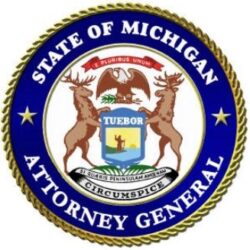
Media Contact:
Ryan Jarvi
(o) 517-335-7666 (c) 517-599-2746
FOR IMMEDIATE RELEASE:
Thursday, May 7, 2020
AG Nessel Urges Congress to Strengthen Paycheck Protection Program
23 State AGs Call for More Transparency, Flexibility and Equity in Implementation
LANSING – Michigan Attorney General Dana Nessel and 22 other attorneys general joined together Wednesday in calling for key changes to the Paycheck Protection Program (PPP) to ensure funds are distributed fairly and equitably. In a letter to Congressional leadership, the attorneys general express concerns that the program – while helping some small businesses and their employees – suffered from a lack of transparency, technical savvy and functionality that led to funds being distributed in a manner overly benefitting large, well connected companies. As a result, the coalition argues that both the first and second rounds of funding with this program have left many small businesses across the country underserved by PPP.
“Michigan is home to a multitude of small businesses that are more than deserving of receiving assistance from the Paycheck Protection Program, but many of them were turned away when the first and second rounds of funding quickly ran out,” said Nessel. “That is why I joined with my colleagues from around the nation to ask Congress to continue working to support small business owners in their time of need. By taking the steps proposed by this coalition, Congress can ensure that access to the program is fair and that the funds end up in the hands of those who need it most.”
The coalition is calling for Congress to adopt the following measures before they allocate additional PPP funding:
- Increase Fair Access Funding for Small Businesses: Congress should require the Small Business Administration (SBA) to provide stronger, explicit guidance to lenders to ensure funding goes to small businesses and not large, publicly traded companies. Additionally, the coalition urges Congress to adopt rules that prohibit lenders from giving preference to certain categories of customers over others, such as existing, larger customers or customers whose current debts could create conflicts of interest for the lender.
- Ensure Equitable Distribution: A portion of any future funding for the program should be allocated exclusively for minority-owned small businesses. That funding should be fairly distributed across metropolitan areas, and small banks and credit unions should be fairly represented as lending sources involved in the program. The coalition also calls for the SBA to create a simple and straightforward process for “unbanked” or “lesser-banked” small businesses or those that do not wish to apply through their current financial institution to receive funding.
- Better Communication and Transparency: Congress should direct the SBA to provide more direct guidance to businesses during the application process. They also call for the SBA to be required to disclose more granular data on the percentage of loans in various size categories, the number and amount of loans processed by each lender, and the geographic distribution of all loans by metropolitan statistical area, borrower demographics – including gender, race, and ethnicity – and comprehensive data on the businesses that receive funding.
- More Flexibility and Technical Support: The program does not adequately serve small businesses and requires more flexibility. The coalition calls for longer time limits for businesses looking to rehire employees, around repayment and forgiveness requirements to businesses that allocate a smaller amount of revenue to salaries, and expanding qualifications for loan forgiveness. They also urge Congress to provide the SBA with greater funding to improve technical support and mandate a uniform, user-friendly process for lenders.
Nessel joins the attorneys general from California, Connecticut, Colorado, the District of Columbia, Delaware, Hawaii, Iowa, Illinois, Maryland, Massachusetts, Minnesota, New Mexico, New York, Nevada, North Carolina, Oregon, Pennsylvania, Rhode Island, Vermont, Virginia, Washington and Wisconsin in sending this letter.
|


